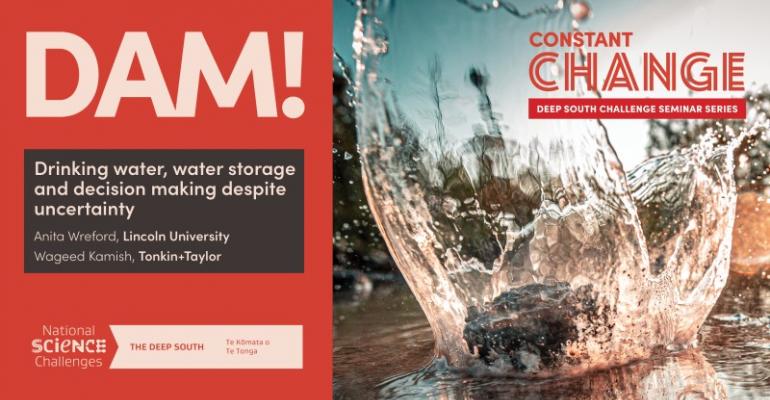September 9 2020
12pm-1pm
Location
Virtual hui | To participate via ZOOM, please register first by clicking the below link
DAM! Drinking water, water storage and decision making despite uncertainty

Recent and ongoing drought in Auckland and Northland highlights how vulnerable New Zealand’s water infrastructure is. We haven’t yet hit Day Zero – as happened in South Africa when Cape Town ran out of drinking water – but the spectre of thirsty people and thirsty paddocks looms large.
So is our infrastructure planning up to the task? And are our planners making the smartest possible investment decisions, given that water availability under climate change is critical but also uncertain?
Can our dams and reservoirs be designed with both climate projections and flexibility into the projects’ very foundations? The short answer is, yes. In this seminar, Anita Wreford (Lincoln University) and Wageed Kamish (Tonkin+Taylor) will take you through their research projects, which address different aspects of these questions: Making robust decisions about New Zealand’s water and Drinking water, drought and climate change.
Anita’s research has tested a method for designing flexibility into large climate adaptation projects. Called Real Options Analysis (ROA), the method is useful across a range of investment decisions in New Zealand, where the initial cost is large and the investment is at least partially irreversible.
Using the case study of an on-farm irrigation scheme, Anita’s multidisciplinary team – including hydrologists, economists and farm specialists – considers that ROA enables more cost-effective investment than cost-benefit analysis, for example, or other methods that use only a single climate scenario.
Wageed’s research investigates the drinking water risks that urban and rural communities would be exposed to under “yet to occur droughts” due to climate change. These risks have not, until now, been quantified. As in Anita’s project, Wageed’s team developed and tested new methods for quantifying this risk. The team’s work represents a first substantial step towards the development of a practical, transparent way of assessing the potential impact of climate change on reservoir and catchment yields for water supply.
This seminar is the first in our new-look, Covid-era Constant Change seminar series. We hope you’ll join us online from home, from your office or from the waiting room of a Covid-testing facility, to make sure we keep climate change at the forefront of planning and investment in this time of global pandemic.
ABOUT OUR PRESENTERS
Anita Wreford
Anita Wreford, Lincoln University, is an economist and leader of our Impacts & Implications programme. She's experienced across many areas of climate change, including economic evaluations of adaptation and applying robust methods to deal with climate uncertainty; identifying and evaluating the effectiveness of adaptation options across sectors; mitigation options and costs in agriculture; community resilience to extreme weather events; and adaptation decision-making among various stakeholders.
Wageed Kamish
Wageed Kamish is a Senior Water Resources Engineer with Tonkin+Taylor. He's a technical expert in waterway water quality, including on the effects of pollution from urban and rural environments. He has over 23 years’ experience in performing and managing water quality assessments for water resource projects, hydrodynamic and water quality modelling studies as well as hydrological modelling studies. He has also been involved in computational fluid dynamics (CFD) analyses in support of detailed bulk infrastructure design.